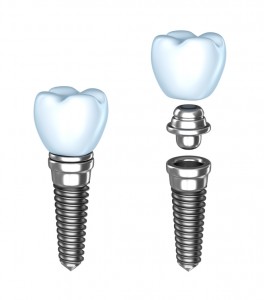 Dental implants, tooth implants, teeth implants – many names for one remarkable device. No matter the label you know it by, the dental implant deserves your attention. As both a dental restoration and an aid to other restorations, the dental implant plays a vital role in restoring stability to replacement teeth. If you’re missing teeth, you’ve probably considered your restorative options. Found them wanting? Pairing dentures, partials, or a bridge with implants will lend them an unparalleled foundation that will make them feel like the real thing.
Dental implants, tooth implants, teeth implants – many names for one remarkable device. No matter the label you know it by, the dental implant deserves your attention. As both a dental restoration and an aid to other restorations, the dental implant plays a vital role in restoring stability to replacement teeth. If you’re missing teeth, you’ve probably considered your restorative options. Found them wanting? Pairing dentures, partials, or a bridge with implants will lend them an unparalleled foundation that will make them feel like the real thing.
How Dental Implants Work
In order to understand just why implants are able to accomplish the impressive tasks they tackle, you’ll need to consider exactly what happens when an implant is placed in your jaw. During implant surgery, the implant will be seated in your upper or lower jaw bone. As time passes, that implant will begin to connect to your jaw bone (through a process known as osseointegration). Once the implant is integrated with bone, it has become a true part of your jaw and is ready to support accompanying implants.
It is this connection between implant and bone that allows tooth root replacements to perform as well as they do. You may be surprised by all that they’re capable of; we’ve listed a few characteristics of implants below to broaden your understanding and help you decide whether implants have a place in your own life.
Implant Dentistry Improves Your Oral Health
When you’re missing teeth, your mouth acts as a different type of environment. The gaps left behind by missing teeth are welcome homes for bacteria, leading to the  formation of plaque and gingival irritation. It’s harder to clean these areas (especially the gums), and the site may give rise to cavities on adjacent teeth. Periodontal disease is also likely to follow. Placing a dental implant in the open space will prevent neighboring teeth from suffering, and improve oral health. Removing that bacterial breeding space is a wise decision, and will have enduring effects.
formation of plaque and gingival irritation. It’s harder to clean these areas (especially the gums), and the site may give rise to cavities on adjacent teeth. Periodontal disease is also likely to follow. Placing a dental implant in the open space will prevent neighboring teeth from suffering, and improve oral health. Removing that bacterial breeding space is a wise decision, and will have enduring effects.
Tooth Implants Preserve Bone Density
Your bone density helps prevent your bones from breaking and ensures they are able to perform as usual. When you lose a tooth, the jaw bone formerly connected to the tooth’s root begins diminishing. The bone pulls away from the area and resorbs, dissolving into the bloodstream. An implant will connect with the bone and keep it from weakening. After osseointegration, the bone will remain strong, its density preserved.
Getting Implants Helps Maintain Your Facial Structure
Your teeth and jaw bones play a significant role in your appearance. When you lose one or more teeth, your facial skin will begin to sag and droop. This not only alters the way you look, but can cause you to seem prematurely aged. Implants will maintain your bone density, support your skin, and help keep your appearance youthful.
Dental Implants Will Support Any Dental Restoration
Implants are incredibly versatile. They may be paired with any dental restoration you choose, improving stability and function. Whether you’re replacing a single tooth or every tooth in your mouth, there exists an implant-restoration combination that will do the job (and do it exactly the way you want). Implants work with single crowns, multiple crowns, bridges, partials, and dentures so your options remain open.
Dental Implants Can Remain With You For Life
Few dental treatments have the lifespan of a dental implant. Because of the implant’s construction and its ability to connect to your bone, implants tend to last for decades. It’s feasible that you won’t need to pursue another course of restorative treatment in your lifetime.
Curious about implants’ potential roles in your dental restoration? Get in touch with Summit Dental today.
